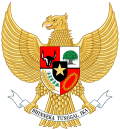This article has multiple issues. Please help improve it or discuss these issues on the talk page . (Learn how and when to remove these messages)
|
Fifth Development Cabinet Kabinet Pembangunan V | |
|---|---|
| 32nd Cabinet of Indonesia | |
| 1988–1993 | |
 | |
| Date formed | 23 March 1988 |
| Date dissolved | 17 March 1993 |
| People and organisations | |
| Head of government | Suharto |
| No. of ministers | 32 ministers |
| Member parties | |
| Status in legislature | Coalition |
| History | |
| Predecessor | Development IV Cabinet |
| Successor | Development VI Cabinet |
| ||
|---|---|---|
Pre-presidency Domestic policy Foreign policy Post-presidency Family
| ||
| Gallery: Picture, Sound, Video | ||
The Fifth Development Cabinet (Indonesian : Kabinet Pembangunan V) was the Indonesian cabinet which served under President Suharto and Vice President Sudharmono from March 1988 until March 1993. The cabinet was formed after Suharto was elected to a 5th term as president by the People's Consultative Assembly (MPR).



